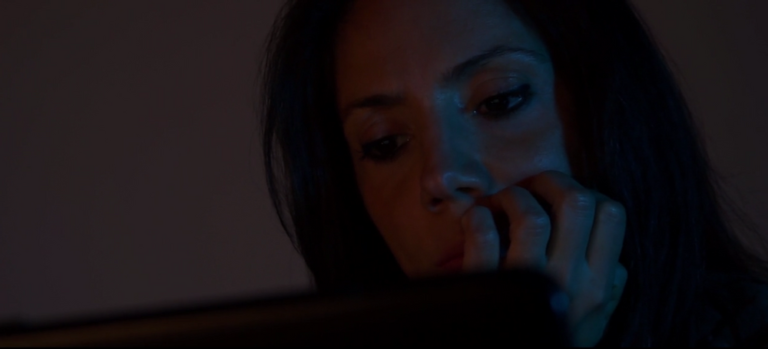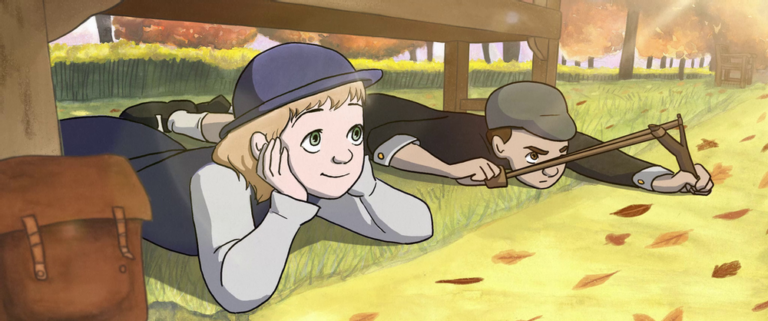All the World’s a Stage: The Limitations of Artifice in DISHONORED
No single image could possibly encapsulate the totality of Josef von Sternberg and Marlene Dietrich‘s artistic collaboration, but the moment that probably comes closest arrives at the end of their 1931 masterpiece, Dishonored. Dietrich‘s Austrian prostitute-turned-spy, Agent X-27, convicted of treason and sentenced to death by her own odious government for saving the life of the enemy spy whom she loves, strikes a pose for the firing squad—back straight, arms akimbo, a gauzy veil obfuscating her icy, erotic face, which is lavishly lit and adorned with a triumphant smile. A boyish officer, still not yet corrupted by the rot of unquestioning patriotism, causes a brief delay to proceedings with an anguished outburst, during which X-27 reapplies her lipstick and adjusts her stockings—she has to look immaculate. And then she’s dead, butchered for her act of compassion, reduced to an inglorious footnote in her nation’s emptily glorious history.
Plenty of films explore the strategies that women are forced to formulate in order to function within hostile environments—but none do so with as much grandeur as the seven works of towering, gleaming genius sculpted by von Sternberg and Dietrich over the course of their fruitful creative partnership, which began in Germany in 1930 with The Blue Angel, and ended in Hollywood in 1935 with The Devil is a Woman. In the 90 years of cinema that followed, such a productive convergence of perfect technicians hasn’t been seen again. Von Sternberg was the only craftsman on the planet with enough aesthetic ambition and sophistication to do justice to Dietrich‘s enthralling, otherworldly beauty, and Dietrich was the only actress on the planet whose meticulously constructed air of suy impenetrability could do justice to von Sternberg‘s formal extravagance. Seen today, their films remain as visually ravishing and emotionally ambiguous as ever, peerless pageants of artifice and charisma.
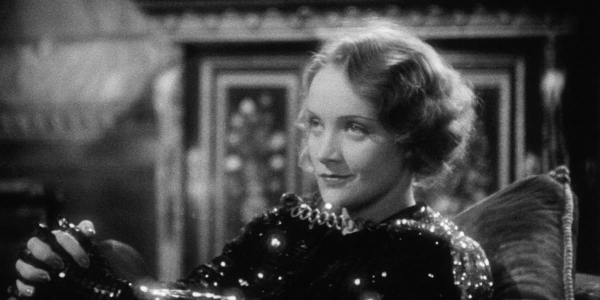
Dishonored is neither the strangest nor the most purely entertaining film in the von Sternberg–Dietrich cycle, but it might just be the most thoughtful, psychologically fertile, and stealthily affecting. Certainly, it boasts Dietrich‘s most exhilaratingly inscrutable performance, stoic, sphinxlike, and poignant from the first frame to last. Victor McLaglen as the devilishly slick Captain Kranau, with whom Dietrich‘s character shares her most thrilling exchanges of deception and seduction, is underrated too, as accomplished a romantic foil for Dietrich as Gary Cooper in Morocco. And von Sternberg, with his intricate writing and visual style, is at his very best as he empathically maps out the possibilities and limitations of female showmanship under an uncaring state that’s actively contemptuous towards women from a certain background.
Showtime
As with any von Sternberg film, the first thing that strikes you about Dishonored is just how alive every sequence is with the potential for spectacle, from a meet-cute at a raucous masquerade ball, to a lonely musical performance in a dismal prison cell. Even on a relatively humble scale, the subject matter of espionage, with its attention to disguise, improvisation, nimble footwork, and sleight of hand, unsurprisingly provides von Sternberg the stylist with ample opportunity to flex his muscles and indulge his impulses. The spaces in which his operatives ply their trade are intimate, intricate, and dynamic, filled with mirrors, screens, fabrics, and other obscuring items. Lingering dissolves, flashbacks, and other structural particularities add further texture to the graceful, fluid yarn.
Beneath this immediately perceptible preoccupation with surfaces, Dishonored is a study of identity—a study, specifically, of female identity-driven inwards, confined to moments of solitude or smuggled under the radar into moments of public expression. Dietrich‘s war widow, already painted by society at large as the whore, the eternal outsider, takes care to shroud her inner life in mystery—she very quickly proves herself to be a savvy operator when dealing with scrutiny and deeply entrenched disdain, actively camouflaging her history, attitudes, and emotions. Swaggering into Secret Service headquarters, where she’ll eventually be recruited and assigned the code number X-27, she refuses to provide her real name, Marie Kolverer, when she’s asked—a conscious omission of information that allows her to lock an essential part of herself away from those who see her as nothing more than an asset to be deployed and then disposed of. Even before she’s ingratiating herself behind enemy lines, she’s already rigorously playing a role—by sustaining an element of the unknown, she renders herself invulnerable to personal attack in an unforgiving milieu.
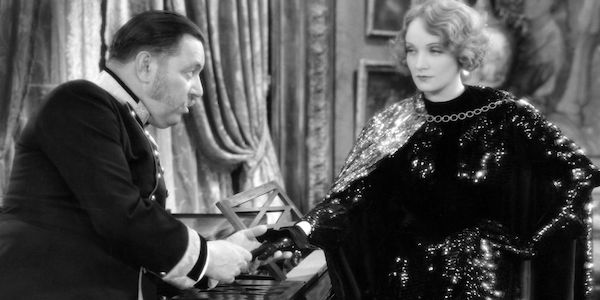
The diligence and pride with which she embodies her profession and performs her self-presentation mark a sort of quiet revolt against the immovable social monolith that holds her down. Knowing that the world, whose perception of her is inextricably bound to the sordid streets, would love to see her die of shame, she resolves instead to take pleasure in her work. “I’m not afraid of life,” she declares at the very beginning of the film, as she watches the body of one of her streetwalker colleagues, who’s committed suicide, being stretchered away—and indeed, her sturdy sense of self-respect is never eroded, withstanding the withering barbs of her compatriots and rivals alike. Simply existing is an act of defiance.
Dietrich perfectly sells that sense of resilience with her cool, unflappable, elastic poise. She executes the broad brushstrokes of the role well, convincingly transforming herself into a simple-minded, meowing peasant chambermaid when Kolverer goes undercover—but more than any other performance in her career, this is a masterclass in minutiae, a showcase of just how much depth you can extract from a gesture, a change in posture, a puff of a cigarette. Through von Sternberg‘s close-ups, which luxuriate in and worship her face, Dietrich alerts us not just to the agility and precision with which Kolverer absorbs and processes information under pressure, keeping her head frozen while her wide eyes flit from side to side, but also to the thrill that she gets out of mastering her craft, her mouth curling into a contented smile with every successful act of subterfuge. In an understated moment that’s just as potent as her final piece of spectacle in front of the firing squad, Kolverer reacts to the damning questions of the tribunal by casually inspecting her fingernails and raising her eyebrows—microscopic statements of apathy which, in Dietrich‘s hands, become memorable indictments of a purportedly noble institution that’s just another meat grinder for marginalised products of an asymmetrical society.
Pitch-Perfect
Of course, the meaningfulness of that defiance has its limits—wise and world-weary, Kolverer seems acutely aware, all of the time, that her sex and social status preclude her from any sort of lasting, substantial victory. She’s hired for her superficial charm and retired for demonstrating human qualities beyond that erotic sheen. Her tribunal at the end of the film tragically crystallises the futility of her plight—having served her country in exemplary fashion, salvaging the war effort with her consummate craft, she’s condemned by those whom she saved as ungrateful scum, a spent instrument of vice who squandered her chance at redemption. Even the Chief of Austrian Secret Service (Gustav von Seyffertitz), the man who recruited her, who recognises and respects her intelligence (although that respect is always intermingled with revulsion), does nothing to rehabilitate her image, simply acknowledging: “I found her on the street.”
The sequence in which the Chief first approaches Kolverer, after he overhears her expressing indifference towards death, is one of the film’s very best and offers us our first and most significant glimpse into the manner in which Kolverer surreptitiously transmits fragments of her personality into tangible artifacts around her. Posing as a foreign agent in order to test Kolverer’s loyalty to Austria, the Chief enters her apartment, and immediately attempts to establish himself as the locus of authority in the room by playing a waltz on her piano, while her homemade dolls, dangling on strings from the ceiling, dance an uncanny dance to his tune. His statement is clear—she’s the puppet, he’s the puppetmaster. When she dares to undermine him, comparing his shoddy technique to a pianola, he’s quick to put her back in her place, refusing to believe that a streetwalker could in any way appreciate the arts: “I suppose you’re a great musician.”
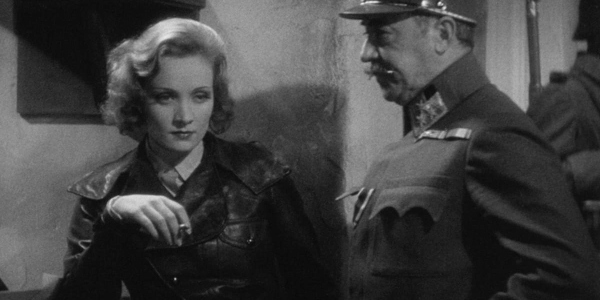
He underestimates her, of course, by thinking that her beauty can’t accommodate complexity. First, she reports him to a nearby constable and has him arrested for treason, and then, once he’s out of sight but still within earshot, she demonstrates her musical superiority by playing the piano with the sort of elegance that he could only dream of matching. Von Sternberg‘s framing is startlingly inventive here, completely eliminating the piano from the shot, focusing exclusively on Dietrich as she strides forwards from the background until her face is almost touching the lens, and begins aggressively hammering away at the keys. Kolverer, master of her own private, humble auditorium, dismantles the Chief’s assumptions, revealing herself as a studied, refined woman, gifted with artistic flair—later, she even transliterates the Russian army’s attack plan into a musical composition, turning the tide with the very talent that her ostensible allies suppress.
A lot of the film plays out like this, with Kolverer luring men into a false sense of security before wrestling the upper hand away from them, building up their expectations before breaking them down again. Her slippery, sensual, guileful presence, causes control to ricochet around the rooms in which she prowls, rather than remain firmly in the grasps of her innately advantaged but far less competent targets. Still, von Sternberg always reminds us that the cold spectre of governmental authority hangs over her actions, making her performances feel as poignant as they are entertaining—small, subversive pleasures for a marginalised individual who’ll inevitably be crushed and forgotten. Meeting with the Chief in his bizarre, almost futuristic office, she nonchalantly reclines in his seat of power after he insults her, appropriating his position as a puppeteer—but von Sternberg‘s composition still situates her between two of the Chief’s convoluted contraptions, emphasising the overwhelming political machinery that’ll eventually swallow her whole.
Conclusion: Curtain Call
Can there be any sort of triumph, in the end, for such a woman existing within such constrictive conditions? The answer, Dishonored seems to suggest, is that to have a good time before dying on your own terms is the best that you can hope for—as bleak and pointless as it might seem in the grand scheme of things, Kolverer’s demise is at least rich with humanity, arising from the conscious decision to seize control over her own destiny and that of her otherwise doomed lover. By deliberately dropping her gun in order to allow Kranau to escape, she declares her love while protesting against systemic inhumanity, refusing to be responsible for the destruction of another life. In a shot of astonishing oneiric sublimity, von Sternberg captures Kolverer looking enigmatically into the distance as her lover makes his way to safety, searchlight beams dancing and shimmering over her satisfied, even euphoric face.
The ecstasy of this moment is only deepened by the horror with which the climax of The Scarlet Empress, the perfect companion piece to Dishonored, is suffused. Over the course of that film, the penultimate work in the von Sternberg–Dietrich cycle, Dietrich‘s Catherine II rises from helplessness to greatness, managing not just to assert herself within a vicious system, but to dominate that masculine milieu—the price, though, is too heavy. Late in the film, after her innocence has been devoured by the beasts of the Russian court, Catherine makes a bold claim about her sexuality: “I think I have weapons that are far more powerful than any political machine.” And while she indeed appears to conquer that machine, winning the loyalty of the Russian army with her body and crushing her competition for the throne, her victory is hollow—she’s been conquered too, made ugly by the ruthlessness that she’s inherited, transformed into just another paragon of cruelty in a long chain of maniacs and tyrants.
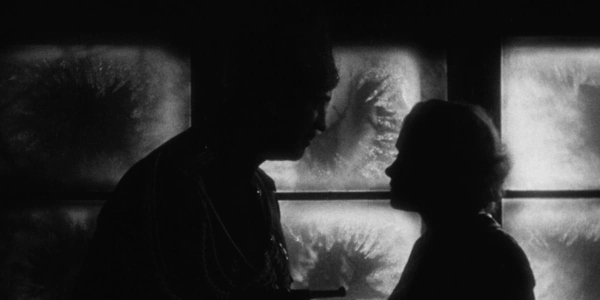
So, you either get out while you’re still human, or you stick around long enough to be contorted into something unrecognisably grotesque—better to die oppressed than become the oppressor. Kolverer, we sense, plans from the very beginning to burn out rather than fade away—ignoble death, she says, is “only another exciting adventure.” Her final performance is her truest, her most resonant, shedding the costume of the state and once more donning her streetwalker clothes, the uniform in which she served her countrymen, instead of her country. By the time the curtain falls, she’s moved the young officer to tears and the Chief to a mournful salute—quite the show.
Have you seen Josef von Sternberg’s Dishonored? Let us know in the comments below!
Watch Dishonored
Does content like this matter to you?
Become a Member and support film journalism. Unlock access to all of Film Inquiry`s great articles. Join a community of like-minded readers who are passionate about cinema – get access to our private members Network, give back to independent filmmakers, and more.
Join now!


